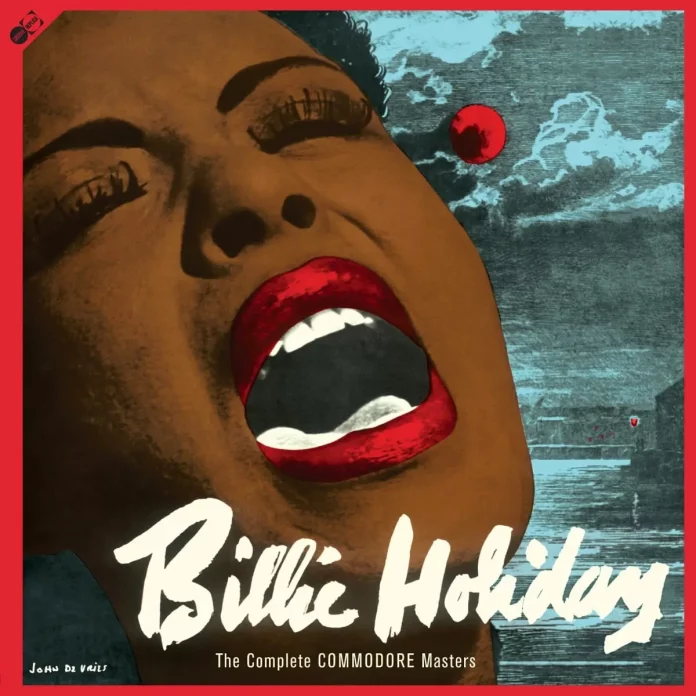These seminal but generally under-appreciated recordings were made between 1933 and 1944, and all were produced by Billie’s mentor and friend Milt Gabler. He founded the Commodore (jazz) label and also ran a record store (and meeting place for musicians) on West 52nd Street in New York City.
The 16 tracks on this well-produced vinyl compilation have already appeared on several CDs, including Commodore Classics (Fine And Mellow, 1939 And 1944 and I’ll Be Seeing You, 1944), with additional takes of most of the titles. Completists will possess all of these; newcomers could well settle for these undoubted master takes.
The initial session came about when Columbia (Billie’s label at the time) refused to record Strange Fruit – a song composed by poet “Lewis Allen”, the pen name of socialist Abel Meeropol. It was a scathing and dramatic indictment of southern white racism – evident in the almost routine lynching of African-Americans who were the “strange fruit hanging from the poplar trees”.
The song became a staple of Billie’s repertoire, but has always divided critics as to its merits. This first recorded version retains an immediacy and impact, despite her reservations about being identified with its sentiments. Ironically, as Leonard Feather recalled, although the song “attracted the intelligentsia, the real hit for the Harlem juke box trade was Fine And Mellow”, an uptempo blues that was released on side B. But as her biographer Donald Clarke has observed, eventually the song was to become “the equivalent of a top-twenty hit, despite being banned by most radio stations”. Incidentally, Meeropol also wrote the House I Live In – a plea for racial and religious tolerance sung by Frank Sinatra in a 1945 RKO movie short of the same title.
There is little to choose between the remaining 14 titles on the album. The minimal contributions of her accompanists – who include pianist Eddie Heywood (also responsible for the unimaginative arrangements), Frankie Newton, Vic Dickenson and Sid Catlett, are of little interest. Yet in spite rather than because of the desultory arrangements, Billie is already at her impeccable best, delivering memorable readings of My Old Flame, I’ll Be Seeing You, He’s Funny That Way and (best of all) I Love My Man. To write any more about these landmark sessions would court the danger of lapsing into hyperbole. Listen and reflect.
Discography
(1) Strange Fruit; Yesterdays; Fine And Mellow; I Gotta Right To Sing The Blues; (2) How Am I To Know; My Old Flame; I’ll Get By; I Cover The Waterfront; (3) I’ll Be Seeing You; Embraceable You; As Time Goes By; (4) He’s Funny That Way; Lover Come Back To Me; I Love My Man (aka Billie’s Blues); On The Sunny Side Of The Street (51.05)
Holiday (v) on all tracks with:
(1) Frankie Newton (t); Tab Smith (as, ss); Kenneth Hollon, Stanley Payne (ts); Sonny White (p); Jimmy McLin (g); Johnny Williams (b); Eddie Doughery (d). Newton, Smith and Payne out on Yesterdays. New York, 20 April 1939.
(2) Doc Cheatham (t); Vic Dickenson (tb); Lem Davis (as) Eddie Heywood (p & cond); Teddy Walters (g); John Simmons Sidney Catlett (d). New York, 25 March 1944.
(3) As above. New York, 1 April 1944.
(4) Eddie Heywood (p); Teddy Walters (g); John Simmons (b); Sidney Catlett (d). New York, 8 April 1944.
Waxtime In Color 950722
















